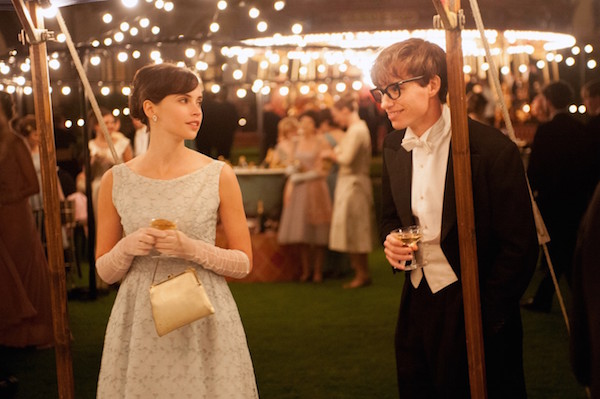A touching story about one of the world’s most brilliant scientist’s battle with a motor neuron disease, “The Theory of Everything” is a movie about the beauty and tragedy of love and science.
The storyline, based on Jane Wilde’s memoir “Traveling to Infinity: My Life with Stephen,” spans four decades of Stephen Hawking’s life, from his time as a Cambridge student to the publication of his book “A Brief History of Time” and separation from Wilde, his first wife. The story begins as Hawking (Eddie Redmayne) falls in love with Wilde (Felicity Jones) at a New Year’s party at Cambridge. However shortly after their relationship begins, he is diagnosed with Lou Gehrig’s disease, also known as amyotrophic lateral sclerosis, or ALS, and is given two years to live. Wilde’s decision to continue their relationship results in an imperfect love story filled with hope, despair, confusion and inspiring perseverance.
Redmayne delivers a stunning performance, conveying a host of emotions solely through facial expression for the second half of the movie, staying true to the physical limitations of Hawking’s disability. Jones’ portrayal of Wilde is brilliantly imperfect; it preserves the authenticity of the story by not biasing the audience toward her character. The fact that both Stephen Hawking and Jane Wilde approve of this interpretation is a credit to the direction by James Marsh, who has successfully pursued realistic interpretations before with his direction of “Man on a Wire,” which won an Academy Award for Best Documentary Feature in 2008.

Other notable performances include Charlie Cox’s portrayal of the character of Jonathan Hellyer Jones, family friend of the Hawkings and Wilde’s eventual love interest, and David Thewlis’s portrayal of Dennis Sciama, professor and mentor to Stephen, both of whom managed to steal the screen with their unique perspectives.
The costumes, setting and cinematography all do a great job of contributing to the story while not distracting the audience from it. Sequences of the film seem to be shot in a bluish filter, which compliment the cool palette seen in Wilde’s blue dresses and Hawking’s suits, and ties into Wilde’s description of Hawking wearing a blue jacket on the night they met. The beautiful English landscapes and scenes from Cambridge successfully transport the audience to the era of each scene, and the revisiting of certain locations like Wilde’s church and Hawking’s parents’ house help show each character’s transition throughout the movie.
The choice to end the poignant film by having Hawking revisit all of his memories traveling back to his first kiss with Wilde reestablishes the sentimentality of Hawking’s journey and leaves the audience feeling the irony of the fact that the man without enough time was the first one to explain time to the rest of the world.
“The Theory of Everything” has been nominated for Best Picture, Best Original Music Score and Best Writing Adapted Screenplay. The movie definitely deserves Best Picture and Best Writing Adapted Screenplay wins, but it may be a little undeserving of the Best Original Music Score because nearly the entire soundtrack is classical piano, and more versatility would have been appreciated. Redmayne and Jones have each been nominated for Best Actor and Actress for their performances.
Stephen Hawking’s story is one that ought to be watched by anyone who has ever doubted the resilience of man or believed that heroes come without flaws; “The Theory of Everything” shows that both Hawking and Wilde are such heroes. Though the reality of the Hawking’s experience is often brushed over for the sake of the story and deep exploration of Hawking’s motivations for ending his relationship with Wilde is lacking, this movie achieves what it sets out to do: tell a poignant story of the strength of two people who, faced with seemingly unsurmountable challenges, rely on their passion and love of life to survive. Bitter for its reality, sweet for its message, “The Theory of Everything” is one of the greatest biopics of the year.
“The Theory of Everything”
2 hours, 3 minutes
Release Date: Nov. 21, 2014
Rated: PG-13 for some thematic elements and suggestive material
Directed by James Marsh
Starring: Eddie Redmayne, Felicity Jones, Charlie Cox, Emily Watson, Simon McBurney, David Thewlis

